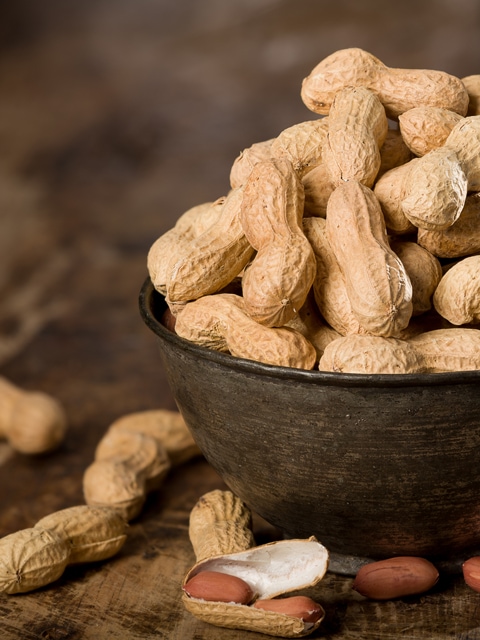Peanuts | Soaking and Drying

 Add to favorites
Add to favorites
Let me take you deep within the rainforests of the Amazon… why? Because we are on a hunt for raw peanuts, raw jungle peanuts that is! These gorgeous heirloom peanuts have a delicate flavor that’s smooth, earthy and aromatic. But they’re not always easy to find. In fact, the only place I have found to purchase them is online.
Are we going Nuts here?
Nope, not me… no nuts around here. Ironically, peanuts are not actually a nut but are, in fact, a legume, a member of the pea family even though it is regularly categorized along with other nuts. They are a good source of magnesium, phosphorus, and manganese, they also contain all nine essential amino acids making them a source of complete protein.

Are Peanuts Raw?
That is a great question. It is challenging to find raw peanuts, but they can be found. You can find raw red-skinned peanuts, raw peanuts in their shell, and jungle peanuts. If you are ever in question if the peanut you are looking down at is a jungle peanut or not, look for a rich golden color with a striped tiger-like pattern. Essential Living carries the jungle peanut and has stated that their wild heirloom variety is completely free of aflatoxins. What are aflatoxins? They are a class of toxic compounds that are produced by certain molds found in food and can cause liver damage and cancer.
What do they taste like?
Raw, truly raw peanuts do not taste like the peanuts that you are most likely used to. Personally, Bob and I don’t care for the flavor of raw peanuts and we tend to enjoy them roasted. I bet you weren’t expecting me to say that, were you? In the recipes that I create on the site, I am using roasted peanuts that have been freshly ground. No salt, sugars, or anything else added to them. Even that form of peanut butter took some getting used to, but now it’s all we eat.
Why must we go through all this trouble? I find soaking nuts a very important step when it comes to my digestion. When nuts/seeds are soaked and/or sprouted in water, the germination process begins, in which the active and readily available amounts of enzymes, vitamins, minerals, proteins, and essential fatty acids begin to be activated.
Nuts and seeds contain phytic acid and enzymes inhibitors which make it quite hard on the stomach and digestion. This simple process can make all the difference in how you feel after consuming them and how your body assimilates them. To read more about the importance of why our bodies benefit from soaking nuts and seeds, click (
here).
 Ingredients:
Ingredients:
- 4 cups raw peanuts, shelled
- 1 Tbsp Himalayan pink salt
- 6 cups water
Preparation:
Soaking:
- Place the peanuts and salt in a large glass or stainless steel bowl along with 6 cups of water.
- Salt is necessary to help neutralize the enzymes.
- Leave them on the counter to soak for 8 hours.
- Loosely cover with a clean cloth, this allows the contents of the bowl to breathe.
- If you think that it will be longer than 8 hours before you can get to them, place the bowl in the fridge, making sure to change the water every so often.
- After they are done soaking, drain and rinse them in a colander.
Dehydrator method:
- Spread the peanuts on the mesh sheet that comes with the dehydrator.
- Keep them in a single layer and dry at 115 degrees (F) until they are thoroughly dry and crisp.
- Make sure they are completely dry. If not, they could mold, plus they won’t have that crunchy, yummy texture you expect from nuts and seeds.
- The dry time will vary due to the machine you own, the type of climate you live in and how full your dehydrator is when drying them.
- Expect anywhere from 12 + hours.
- Allow them to cool to room temperature before storing.
- Store in airtight containers such as mason jars.
- Use within 1-3 months – store in the fridge
- Use within 3-12 months – store in the freezer.
Oven method: (no longer raw)
- Preheat the oven to 225 degrees (F).
- Spread the peanuts on an ungreased cookie sheet in a single layer.
- You may want to spritz the nuts with salt water just before you put them in the oven to give them a light, salty taste.
- Bake for 25-30 minutes.
- When the skins just begin to split is best.
- Don’t leave them unattended, due to their high oil content, they will continue to roast after you remove them from the oven.
- Good idea to stir them around a bit throughout the process.
- Cool for about 1 hour. Make sure that they are cool before storing.
- Note ~ You can also attempt to dry the peanuts in the oven and keep them raw but this is tricky. You will need to set the oven on the lowest setting, keep the door ajar and hang a thermometer in the oven to watch the temperature. Nothing is impossible. With this method… good luck and do your best.
Do soaked nuts and seeds have to be dehydrated?
If you are unable to dry the nuts or seeds, it is best to only soak an amount that you can be sure will used within two or three days. As with any live food, mold tends to set in within days if you’re not careful. They will need to be stored in water, sealed tight and placed in the fridge. It is important to rinse them twice a day with fresh water.
© AmieSue.com



 Add to favorites
Add to favorites
 Ingredients:
Ingredients:
I want to know why you put in salt when you soak the peanuts ? Is it the important things what we soak the nuts , Is it OK if I don’t put in salt to soak any nuts ,
Thank you always .
Hello Sunny. :)
Salt is necessary to help neutralize the enzymes. I recommend it. After soaking, you rinse the nuts/seeds with fresh water which will take away any salt. I hope this helps, blessings. amie sue
love your blog! does roasting alter the nutritional value?
____
also, I’ve heard rum-soaked peanuts stabalize your blood sugar. Again, roasted?, raw?, how long to soak?
Thank you so much for your thoughts on this
Good evening Jim,
Yes, it is believed that roasting nuts decreases the nutritional value. For example (there is a lot on this topic!)…
Fats: when polyunsaturated fats are exposed to heat, they’re more likely to become damaged or oxidized which can lead to harmful free radicals. If you must roast them, do so at a lower and slower temp.
Antioxidants & Vitamins – when roasted at high temps it reduces the benefits of antioxidants and decreases some vitamins.
I would suggest doing some research because there is far too much information for me to put it here. For me, it is a common practice for us to soak and dehydrate all the nuts and seeds that we consume. Along with the worry of losing nutrients when roasted, we soak them to reduce the phytic acid/emzyme inhibitors. We find that we digest them much better with this process.
I am not able to comment about soaking peanuts in rum. I’ve never heard of that before.
blessings, amie sue
Hi, I was wondering whether peanuts need to be soaked as other nuts do if they are not in fact nuts? Do they still have the properties of the nuts you are referring to?
Many thanks
Hello Nicole,
Soaking peanuts can enhance their digestibility and potentially increase nutrient absorption… amie sue